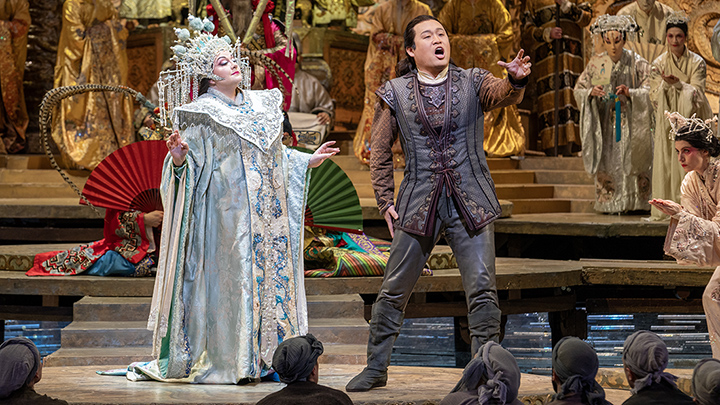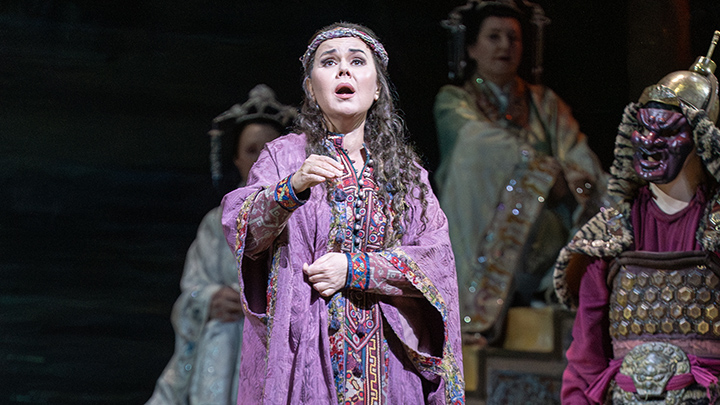
After a monthlong hiatus, the Metropolitan Opera returned with a bang: an acclaimed new production of La forza del destino, followed by a performance of Madama Butterfly, in a production by the late Anthony Minghella, that remains a directorial high point of the Peter Gelb years. On the third night, a warhorse lumbered back onto the stage. The Franco Zeffirelli Turandot might not be the oldest in the repertory—Dialogues des Carmélites has it beat by a decade—but it feels like it could be. I don’t just mean the outdated Chinoiserie at the heart of this painstakingly literal interpretation.
Although it has been sporadically refreshed since its debut in 1987, the staging looks increasingly tired. The Act I pagodas resembled a tiki restaurant that went out of business years ago and progressively turned to rubble. Amid the gaudy palatial courtyard of the second act, I searched in vain for a red velvet booth where Shelley Levene was imploring his boss to give him the good leads—the Glengarry leads. The faded scrim that dominates the third act, meant to suggest an ocean, instead called to mind something you’d find hanging on the wall of an incense shop.
Revival director J. Knighten Smit took his cues from Zeffirelli’s playbook: presentational, opulent, empty. The libretto constructs a thin story to begin with, but here one cannot find even the barest suggestion of an inner life for any of the characters. Whatever successes the performers score seem to have been gained on their own terms.
It’s helpful, then, that the revival features several artists who demonstrate musical intelligence and fine dramatic instincts. The soprano Aleksandra Kurzak deserves commendation for singing Liù one night after essaying Butterfly, and if you perhaps wanted a touch more oomph in the sound, she compensated with beautifully tapered phrases and seamless legato. Throughout the evening, her voice functioned as a perfectly tuned instrument, moving elegantly between registers. Debutante conductor Oksana Lyniv recognized her musicality and accompanied her supportively, reining in the bombast to complement an essentially lyric sound.
Kurzak also made for a riveting presence onstage, especially in silence. Her expressive, heart-shaped face conveyed anger, sorrow, resignation and, finally, ecstasy as Liù went to her death holding the secret that Turandot sought to tear from her. I found myself searching for her often in the crowd scenes of the second act, where she has virtually nothing to sing, but where she remained a committed figure on the sidelines, bringing depth where others might simply coast.
If Elena Pankratova didn’t quite match Kurzak’s command of the stage, she at least presented Turandot as a conflicted figure, caught between her emotions and her sense of duty, rather than a standard-issue ice queen. She convincingly conveyed the character’s fear at being possessed by a man in Act 2, as well as her burgeoning love in Act 3.
Musically, though, she ran into some typical problems with the score. Legato eluded her most of the night, and lower notes tended to curdle. The voice took on an unpleasant edge in the role’s more lyrical phrases. Pankratova sounded her best when blasting notes out at forte, which emerged with a trumpet-like resonance, but that part of her voice also seemed disconnected from the rest. Although Lyniv was similarly sensitive to her needs, the orchestra and chorus sometimes swamped her.
The promising tenor SeokJong Baek, in his first season with the Met, had a varied evening. He tended toward brute force in the first act, especially in “Non piangere, Liù,” where one wanted a touch more lyricism. That could have been nerves, though, or simply the need to warm up. The voice was in top form throughout the second act, with a pleasing richness that suggested his former training as a baritone. And if you could perhaps sense the gears turning a bit too obviously in his “Nessun dorma,” the overwhelming ovation he earned was certainly justified.
Vitalij Kowaljow made for a soulful Timur, and Lindemann Artist Le Bu impressed mightily in the small role of the Mandarin. Among the three ministers of state, Joo Won Kang was particularly memorable as Ping, although the highly stereotyped conception of these characters felt more unpalatable than ever. The chorus tended toward brawn rather than balance.
In addition to supporting the singers, Lyniv led a distinctive reading of the score, with strong contributions from the strings and brass, and ethereally suspended playing on the harp. From a musical perspective, the evening came together admirably. As a work of theater, though, it was as stale as last week’s takeout.
Photos: Karen Almond/MetOpera



























Comments